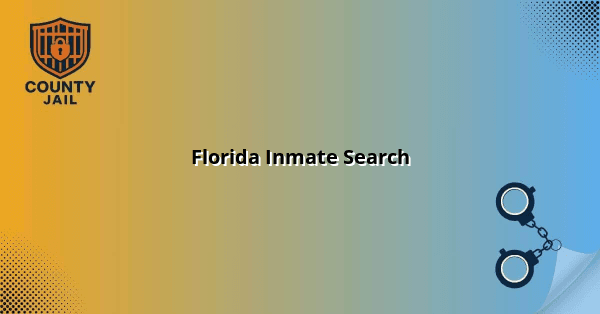Florida is a state with many jails that hold inmates. People often want to find out about those who are in jail and what they are charged with. Understanding how to look up information about inmates can help families and friends stay connected and informed.
Florida also has a system for keeping track of inmates in county jails. Knowing how to search for an inmate can make it easier for people to find their loved ones. This information is important for those who want to support someone who is in jail.
Inmate Information in Florida
Florida is a state with a variety of jails housing inmates. Knowing how to access information about these inmates can be beneficial for families and friends who wish to stay connected.
How to Find Inmate Information
To look up inmate information in Florida, you can use online databases that provide details about individuals incarcerated in various jails across the state. These platforms allow users to search by name, date of birth, or other identifiers. This accessibility makes it easier for families to find their loved ones and understand their current status.
Florida Department of Corrections
The Florida Department of Corrections (FDC) plays a crucial role in managing the state’s prison system. They maintain records on inmates, including their charges, sentencing, and location. By visiting the FDC’s official website, individuals can access a wealth of information regarding inmates, including release dates and parole information.
County Jail Systems
Each county in Florida has its own jail system, which may have different procedures for inmate information retrieval. Typically, county jail websites provide inmate search tools where you can find details specific to that county. This can include booking photos, charges, and bond information that may assist families in supporting their incarcerated loved ones.
Visitation and Communication
Maintaining communication with inmates is vital for their emotional well-being. Florida jails usually have established guidelines for visitation, phone calls, and mail. Understanding these rules can help families stay connected and provide necessary support to inmates during their time in jail.
Legal Resources and Support
Inmates in Florida have access to various legal resources. Families can seek assistance from legal aid organizations that provide support related to criminal charges. This can be essential for inmates who need guidance on their rights and the legal processes they face.
Exploring Florida’s Correctional Facilities
Florida has a diverse range of correctional facilities that serve various functions within the criminal justice system.
Overview of Florida’s Jail System
Florida’s jail system includes both county jails and state prisons, catering to a variety of offenses and rehabilitation needs.
Types of Facilities in Florida
- County Jails: Operated by local authorities, housing individuals awaiting trial or serving short sentences.
- State Prisons: Designed for individuals convicted of more serious crimes with longer sentences.
- Private Prisons: Facilities operated by private entities under state contracts, intended to alleviate overcrowding.
Programs Available in Florida Jails
Many jails in Florida offer programs aimed at rehabilitation and reducing recidivism.
- Educational Programs: Including GED preparation and vocational training.
- Counseling Services: For mental health support and substance abuse treatment.
- Reentry Programs: Assisting individuals in transitioning back into society post-release.
Visitation Policies
Visitation rules vary by facility, but they typically require prior approval and adherence to specific guidelines.
- Visitation Schedule: Defined times during the week for family and friends to visit.
- Contact vs. Non-Contact Visits: Some facilities may offer contact visits while others have restrictions.
Inmate Rights in Florida
Inmates in Florida retain certain rights while incarcerated, including access to healthcare and the ability to communicate with legal counsel.
Frequently Asked Questions
In this section, we address common inquiries related to jails in Florida. Whether you’re seeking information about the facilities, inmate procedures, or visitation rules, our FAQs aim to provide clear and concise answers to help you navigate the system.
What are the main types of jails in Florida?
Florida has several types of jails, including county jails, municipal jails, and federal detention centers. County jails typically hold individuals awaiting trial or serving short sentences, while municipal jails are smaller facilities operated by cities. Federal detention centers house individuals awaiting trial for federal offenses or those serving federal sentences.
How can I find information about an inmate in Florida?
To locate an inmate in Florida, you can use the Florida Department of Corrections website, which offers an online inmate search tool. Additionally, you can contact the specific county jail directly for information. Details such as inmate status, charges, and sentencing information are typically available to the public.
What are the visitation rules for jails in Florida?
Visitation rules vary by facility in Florida. Generally, visitors must be on an approved list and present valid identification. Visits may be conducted in-person or via video, depending on the jail’s policies. It’s important to check specific guidelines of the facility where the inmate is housed, as hours and regulations can differ.
What are the rehabilitation programs available in Florida jails?
Florida jails offer various rehabilitation programs aimed at reducing recidivism. These programs may include educational courses, vocational training, substance abuse treatment, and mental health services. Participation in these programs can help inmates gain skills and support for reintegration into society upon release.
What rights do inmates have in Florida jails?
Inmates in Florida jails have certain rights protected under state and federal law. These include the right to humane treatment, access to medical care, and the ability to communicate with legal counsel. Additionally, inmates have the right to participate in programs that promote rehabilitation and education.
How does the bail process work in Florida?
The bail process in Florida allows individuals arrested to secure temporary release from jail while awaiting trial. A judge sets bail based on the severity of the charges and the individual’s criminal history. Bail can be paid in cash, through a bail bondsman, or by property collateral, depending on the amount set.

